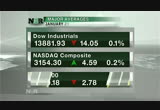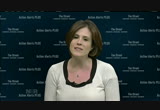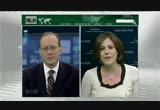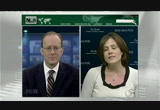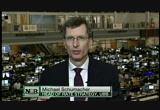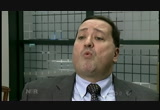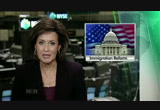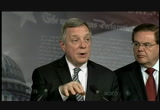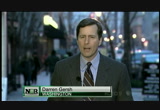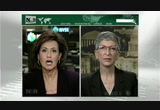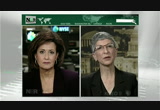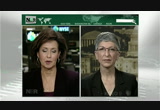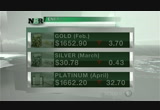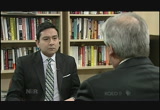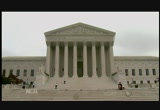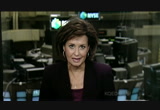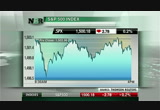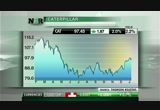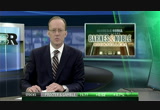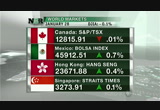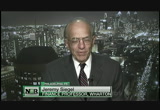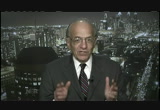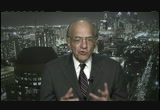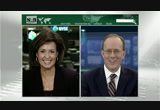tv Nightly Business Report PBS January 28, 2013 7:00pm-7:30pm PST
7:00 pm
but on wall street today, stocks struggled. the dow fell 14 points, the nasdaq rose four-and-a-half, the s&p 500 lost almost three points, breaking an eight- session winning streak. >> tom: tonight's "word on the street" is yahoo. nicole urken is a research associate at thestreet.com. she joins us from new york tonight. nicole, let's focus first on the core business, the underlying advertising business. interesting die cot me here, display aad revenue was down, number of ads sold for yahoo! properties was down but the price per ads were higher. do this differential for us. >> the big focus this quarter is on the core business. the honeymoon period is over for new c.e.o. marissa maher, so the business play business like you mentioned values were down. it was a one off event related to the he olim-- related to the olympics so we have to see if that quarterly strength can continues, in the sure
7:01 pm
right now. >> tom: what about on the search side, yahoo! made its name in the pregoogle days of search and search advertising. that seems to be pointed higher in the last quarter. >> yeah, search is very important. marissa maher has pointed to the fact that they have a lot of gaps to make up relative to the industry leader google. so within search they did perform 14% growth year-over-year. that was seen as very strong. investors are applauding am we'll see if that continues. they certainly have a long way to go. this has not been a strong point in recent years for the company. >> no, it hasn't. i mean google of course a big competitor and facebook in more recent years, marissa maher the new c.e.o. came in in july from google. she's promised to take yahoo! back to its roots. what are yahoo!'s roots? >> yeah, a leg part of the run-up in the stock, since she joined is because of the realization of the monday at thization of the asian assets, particularly
7:02 pm
alibabba an also potentially yahoo! japanment but right now the big question is can yahoo! come a little bit back in terms of display and search. those are its roots. and right now this quarter shows a little bit of headway but it remains a show-me story and right now the valuation is factors in a good amount of optimism based on this new and vibrant c.e.o.. >> let's talk about that. why-- you can certainly earning the exclamation point in the corporate name yahoo!, since she came in back in july, really since september the share price has almost gone straight up from the low teens now to $20 in change. what do you make of the stock price here. is the spin-off of the join ease asset its baked in, is the anticipation of marissa maher and what she can do to search already baked in? >> some of it is baked in. certainly 9, some of the part at nal sis has been given more credence because we've seen some headway in the monday at thisization of
7:03 pm
the alibaba stake. back in september yahoo! closed on half of its stake and that open its up the potential to monetize the remaining portion. we're expecting an ipo of the company later it this year of alibaba. but i think at this point it remains again like you mentioned, back to the core business, a show-me story from marissa. can they continue to roll out their mobile strategy? can they bring those searchers back to the core business. at this point some of the parts value is largely played out. >> tom: dow own any yahoo! shares. >> i do not. >> narrator: nicole urken with us, with thestreet.com. >> susie: still ahead, competition is heating up in the generic drug space, we hear from the c.e.o. of the biggest generics maker in the country. a red flag for bond investors today: the yield on the 10-year treasury briefly pierced 2%, the first time its crossed that
7:04 pm
level since last april. with rates going up, it's going to be harder to make money the bond market. no wonder investors have been selling bonds and buying equities. suzanne pratt takes a look at why investors may have lost their taste for treasuries. >> reporter: ever since the financial crisis whip-sawed the stock market, investors have bet big on bonds. from treasuries to corporates, the bond buying has been relentless, and the returns robust. but, it now seems the tide may be turning, as investors rediscover equities, and rebuff bonds. is it because something sinister is brewing in the bond market, or are stocks simply more attractive? u.b.s. bond expert mike schumacher says its the later. >> i think it's more exiting some of the safe haven positions they had in bonds rather than saying bonds themselves look unappealing for other reasons. >> reporter: when the u.s. government was teetering on the edge of default, the bond market looked like a good place to hide. and, now that it seems politics
7:05 pm
are out of the headlines, there's less of a need for investors to hunker down. but, some bond market pros say political risk is not going away for long. they point to the march first deadline for government spending cuts as a reason for investors to come back into bonds. >> it's always hard to parse the dialogue coming out of washington. but, it seems like the republicans want the sequester actually to go forward which would put the breaks on the economy at least to an extent and drive more people back into bonds. >> reporter: others say any return to bonds may be short- lived, as the u.s. economy is showing new signs of strength. >> i think we expect more improvements, moderate improvements. but, you know overall that's usually a cause or thought that rates could go higher. and, in that regard it's probably not a market that will have the same sort of returns that we've seen over the past two years. >> reporter: so, it seems most agree the bond market is unlikely to be a cash cow for investors going forward. at the same time, however,
7:06 pm
worries about a bond market bubble seem unfounded. suzanne pratt, "nightly business report." >> susie: immigration reform takes center stage this week. a group of senate democrats and republicans agreed today on what they called a framework for comprehensive immigration reform. tomorrow, president obama heads to las vegas to give a policy speech on immigration. with washington focused on immigration, citizenship for millions of illegal immigrants could be the first major action in president obama's second
7:07 pm
term. darren gersh reports. >> reporter: the senators-- four republicans and four democrats-- argue we have already granted a kind of amnesty to the 11 million undocumented workers who live in the shadows of american society. >> we have been too content for too long to allow individuals to mow our lawns, serve our food, clean our homes, and even watch our children while not affording them any of the benefits that make our country so great. >> reporter: the "framework" the senators released today calls for tighter enforcement at the border and of existing immigration laws in return for granting immediate legal status for the 11 million undocumented workers now in the country. in the future, the number of new immigrants would be tied to the availability of jobs. >> we are going to enshrine in here the principle that americans get the first grab at it. americans get the first opportunity and that's the way it should be. >> reporter: critics say they've heard this all before. the federation for american
7:08 pm
immigration reform blasted the bipartisan proposals, saying "it is legislation that provides amnesty to millions of illegal aliens, more employment based immigration at a time of historically high unemployment, no end to family chain migration, and vague and worthless promises that illegal immigration will be controlled in the future." in the face of fierce opposition, maintaining bipartisan support for reform won't be easy. >> there are people who are concerned about how much this is going to cost the american economy. we have to be frank about dealing with those. this country owes $16 trillion. by the same token, i think we need to be honest with ourselves about how important immigration is for our economy, for agriculture, for guest workers and other laborers. business groups are pushing immigration reform because they want easier access to highly trained workers. the bipartisan group of senators agree and want to award a green card to immigrants who get a ph.d. or masters in science, hi tech or engineering from an american university. darren gersh, "n.b.r.,"
7:09 pm
washington. >> susie: joining us now with more about immigration reform, tamar jacoby, president and c.e.o. of immigration works u.s.a. tamar, you heard daren as reported business groups are pushing for immigration reform, others are worried that there might be an economic cost of immigration. how do you see it? what is the economic impact of immigration, what does it -- >> immigrants are critical of economic growth, economic growth is based on two things, innovation and an adequate workforce, immigrants provide both, high skilled immigrants are innovaters and low skilled immigrant does jobs that americans are too educated to do. >> susie: so what does this mean for your, the group that you represent, there are many small businesses. they hire a lot of less skills immigrants. is this going to help or hurt them. is it going to create more competition for those small businesses? >> no, those, the employers
7:10 pm
i represent desperately want a legal way to hire low-skilled workers. they're running restaurants. they're running food processing operations, they're running tels and they face a choice right now. they hire workers and they run them through the system but they're never sure if those cards are accurate or not. whether the system is really accurate. they want ways to hire legal immigrants so that they're not putting their businesses at riskment and ideally this will offer that, both by legalizing people already here but also creating a line for workers to come in in the future, a pipeline for legal, low skilled workers to enter the country. >> how do they feel about this framework, a lot of new rules will come into play here, employee verification papers, things like that. what, how does your group feel about that. >> of coursing of course. businesses are always wary of regulations. but right now businesses are desperate because they want to hire workers and they are never sure if they are on
7:11 pm
the right side of the law this will create some regulation but employers will also sleep at night knowing that they're confident they are on the right side of the law. >> you know, nothing is easy to get done in washington. we've certainly seen that with all of their budget talks. how about immigration reform. are we going to see this getting done in washington this year? >> well, that's what is so stunning about today. it's only january. many members of congress hardly even know where their offices are and already these eight have shaped the outline of a deal. that's very impressive, very early, creating a lot of momentum. you're right it going to be hard and members of congress have forgotten how to make deals. but this is a very encouraging start. >> and you know we talk a lot about jobs. jobs for immigrants, jobs for americans. we have so many experts who come on our program every night an they're forecasting a very weak economy. and not enough jobs for everybody. how do you think that's going to play into the
7:12 pm
debate? >> yeah, so immigrants are not like americans, right. americans are in the middle. we're pretty educated but not too much. immigrants are either not very educate order very educated. so they actually compliment complement us and create jobs. voters don't always know that. that is a hard concept to explain to people but that's why we need law make ares and advocates who can make that case to people in the coming months. immigrants help create jobs. they don't take jobs from americans. >> certainly this will be topic a for a while. thank you so much for coming on our program, tamar jacobby.
7:13 pm
>> susie: when it comes to drugs, the generic pharmaceuticals business has been on fire as more and more insurers move customers to generic medicine as a way to trim healthcare costs. one of the beneficiaries has been watson pharmaceuticals. ruben ramirez reports. >> reporter: watson pharmaceuticals has a new name and a new logo. the world's third-largest generic drug maker changed its name to actavis, a company watson bought last fall. c.e.o. paul bisaro says its no stranger to growth through acquisitions. >> in the short-term we'll be looking for add-on acquisitions whether it's in the branded space where we continue to be very aggressive in the areas of women's health and urology trying to find new therapies we can bring to market. i think a bigger transaction for us would probably await 2014, or 2015. >> reporter: with acquisitions come redundancies, actavis is cutting jobs and moving operations out of its original corona, california facility.
7:14 pm
>> most of the products that are manufactured in that facility will be moving to our florida facility or our elizabeth, n.j. facility, so there will be some additional increases in people in those facilities. we'll also be moving to some overseas locations. >> reporter: investors have seen a nice run-up in the shares this year, though they've been hovering between $80 and $90 a share since last fall. >> since 2008 we've had a compound annual growth rate of over 30%. and every year since 2007 we've grown double digits so it's our commitment to continue to grow double digits on an earnings basis i think will drive. i think the stock price will take care of itself. >> reporter: the healthcare insurance reform legislation may be settled law but another supreme court case this spring could have a big impact on the generic drug business. come april, the supreme court will hear arguments over whether so-called pay for delay arrangements are legal.
7:15 pm
in their simplest form, large drug companies pay generic makers to delay producing generic versions of drugs. >> are you preparing for either a win or a loss? it's hard for me to foresee an outright ban of settlements in the patent space. frankly i don't understand how the supreme court would make a distinction between the pharmaceutical space and say the technology space. why is it that google and everybody can settle their cases but we wouldn't be able to settle ours. >> reporter: however the supreme court rules, there's no denying that generic drug makers will continue to gain momentum as one way to trim the skyrocketing cost of health care. ruben ramirez, "n.b.r.," new york. >> susie: warren buffet was the hot topic of conversation here at the big board today. according to several reports, it looks like buffet's berkshire hathaway, made a bid to acquire the new york stock exchange, last fall, but the exchange already had a higher bid on the table from the intercontinental exchange known as ice. just last month ice came out the winner agreeing to buy the big
7:16 pm
board for $8 billion. buffet has been looking for big tom, we know how much warren buffet has been looking for big deals, what he calls "elephants," in the $20 to $30 billion range. so even if he won the n.y.s.e., this would have been a baby elephant. >> tom: let's get going with tonight's "market focus." >> tom: there was no clear direction for the major stock indices today with the broad market sitting at five year highs. while the s&p 500 spent the day in the red, the trading range was only seven points. the index hit its lowest point of the session after pending home sales for december were released, showing a drop. more of that in a moment.
7:17 pm
the s&p finished a down a fraction. volume was 655 million shares on the big board. just under two billion traded on the nasdaq. the materials sector led the losers, down 1%. the consumer discretionary and financial sectors had more modest declines of 0.5% each. a sour fourth quarter from global machinery manufacturer caterpillar, and a lackluster outlook for this year, didn't hurt its stock price. first the earnings. cat earned a $1.46 per share, down considerably from a year ago, and well below wall street estimates. the company took a $580 million charge due to accounting problems at a chinese company it bought last summer. cat cut its inventories and production due to lower demand for its machines. but shares were stronger, moving up 2%. caterpillar's forecast for this year was very broad but some are optimistic, thinking caterpillar will generate more cash it could use to improve shareholder value. >> really helping their free cash flow situation. >> reporter: one place
7:18 pm
caterpillar expects to see its business grow is home building. but in december, at least, the number of people signing contracts to buy existing homes fell. so-called pending home sales were down 4.4% last month, coming in below expectations. the national association of realtors said pending sales were hurt by a drop in inventory, with fewer homes for sale, something it expects to improve as we move into the spring. traders and investors took the opportunity to sell shares of homebuilders, perhaps taking some profits from their rallies over the past year. pulte-group fell 3.3%. lennar shed 2.7%. k.b. home was down 2.4%. your favorite barnes and noble bookstore could disappear. the company said in the next decade it will close as many as one out of three of its current outlets.
7:19 pm
it plans to close about 20 stores per year for the next 10 years. today, there are 689 barnes and noble retail bookstores. as part of the company's long range planning, it will reduce that to as low as 450 over the next 10 years. barnes and noble has seen its market-share drop thanks to competition from amazon and e- books. shares were down 1.1%. the company had a disappointing holiday season with sales down 11%. three of the five most actively traded exchange traded product were down. the nasdaq one hundred tracking fund put in the best performance, up 0.2%. and that's tonight's "market focus."
7:20 pm
>> tom: we continue our monday series with some of the nation's top universities to bring you the best research on business, the economy and investing. we call it "n.b.r.-u." our partners combine over 400 years of business knowledge-- harvard, stanford, wharton, and vanderbilt. every monday we speak with top professors about key money issues. and you can read in-depth articles at: www.nbr.com, just look for the nbr-u tab. >> tom: tonight: is the stock market the place to be for long term investing? we spoke with jeremy siegel, finance professor at the wharton school of the university of pennsylvania. i started by asking him if the stock market is still safe for small investors. >> oh, yes, i think so. certainly in the last 10, 12 years we've had two very severe bear markets. and the worst financial crisis in 75 years that hit us in 2008. but i think that 2013 is
7:21 pm
going to mark the recovery of a much faster pace of economic growth than we've had over the last four years. >> one of the places we've seen momentum build in the market is with high frequency trading. and trading in nanoseconds. and we saw the effects of that with a flash crash, for instance, and rules put if place after that. so instead of whether or not the market is safe, is the stock market fair to small investors? >> we should focus on is there value there for long-term investors. there's always going to be some short term volatility in the market. and clearly it's a different game. if you are a day trader, but i hope that most of the people listening to our program are thinking of trying to buy something long-term that will increase in value and give them a big return. and that depends on the valuation of the market. so i wouldn't worry about
7:22 pm
the volatility. in fact, i do think they put safeguards in place that will prevent another flash crash from occurring. but certainly once are you in the stock market one always has to accept the fact that there is going to be some short term volatility. >> but how much volatility is enough volatility, i guess, for long-term investors. is it a movement of 10% for instance in the market, 15%, what should they expect in a normal volatile year? >> well, again, it depends. bear markets usually are 20 to 40%. we just had two major bear markets. the last one more than 50%. but what it did was bring valuations down to such a good level right now that there is no fluff and puff in the stock market. you should be worried about invest are-- investing in stocks when you see a lot of speculation. when you see a lot of, like remember the internet bubble that we had, you know, 12
7:23 pm
years ago. >> tom: right. >> an when i look at values today, i mean even an apple stock is selling at such a reasonable price earnings ratio compared to what we have seen historically, when you should be worried about the market. we don't have that overvaluation today. >> market values may be at multiyear highs. but the value within that price, according to jeremy siegel there seems to be very bullish at this point. we appreciate the insight, professor. from the wharton school at the university of pennsylvania in philadelphia, jeremy siegel. >> susie: tomorrow on "n.b.r." the federal reserve kicks off a two-day meeting, its first policy meeting of the new year, we'll hear from fed chairman bernanke on wednesday. also tomorrow, we'll get a check on the recovery in housing, and its impact home prices and consumer confidence. and we'll see if ford motor's latest results can rev up wall street. >> susie: as tom mentioned, barnes and noble is looking to close a third of its stores over
7:24 pm
the next decade. so we asked some of our facebook friends when was the last time they shopped in a traditional book store. for many, it had been years. but sean says he bought one yesterday, when he needed a gift, and didn't have time to wait for delivery. kirby prefers getting electronic books from his local library, and says he probably won't buy physical books any more. >> susie: tom, when was the last time you were in a bookstore? >> susie: that's "nightly business report" for monday, january 28. have a great evening everyone, and you too tom. >> tom: goodnight susie, we'll see you online at: www.nbr.com and back here tomorrow night.
7:28 pm
7:29 pm
102 Views
IN COLLECTIONS
KQED (PBS) Television Archive
Television Archive  Television Archive News Search Service
Television Archive News Search Service 
Uploaded by TV Archive on

 Live Music Archive
Live Music Archive Librivox Free Audio
Librivox Free Audio Metropolitan Museum
Metropolitan Museum Cleveland Museum of Art
Cleveland Museum of Art Internet Arcade
Internet Arcade Console Living Room
Console Living Room Books to Borrow
Books to Borrow Open Library
Open Library TV News
TV News Understanding 9/11
Understanding 9/11